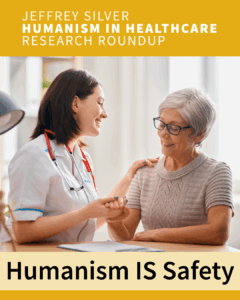 The Jeffrey Silver Humanism in Healthcare Research Roundup features summaries of recently published studies on humanism in healthcare. To receive email notification of new studies once per month, enter your information here and select “Jeffrey Silver Research Roundup” from the checkboxes at the bottom. See previous posts in this series.
The Jeffrey Silver Humanism in Healthcare Research Roundup features summaries of recently published studies on humanism in healthcare. To receive email notification of new studies once per month, enter your information here and select “Jeffrey Silver Research Roundup” from the checkboxes at the bottom. See previous posts in this series.
Publications from Gold Foundation-Affiliated Authors
Teaching professionalism in graduate medical education: What is the role of simulation?
Wali E, Pinto JM, Cappaert M, Lambrix M, Blood AD, Blair EA, Small SD. Surgery. 2016 May 17. pii: S0039-6060(16)30027-7.
This paper was supported by the Arnold P. Gold Foundation Research Institute’s Mapping the Landscape, Journeying Together initiative.
A systematic review of research on simulation-based professionalism training and assessment found that reporting is nonstandardized in methods and terminology and lacks the details required for replication. Authors offer minimum standards for reporting of future professionalism-focused simulation training and assessment as well as a basic framework for better mapping proper simulation methods to the targeted domain of professionalism.
When doctors share visit notes with patients: A study of patient and doctor perceptions of documentation errors, safety opportunities and the patient-doctor relationship
Bell SK, Mejilla R, Anselmo M, et al. BMJ Qual Saf. 2016 May 18. pii: bmjqs-2015-004697.
Dr. Bell is a 2011 Gold Professor.
Researchers conducted pre and post surveys with 99 volunteer doctors at three US sites who participated in OpenNotes and postsurveys from 4592 patients who read at least one note. Patients read notes to be better informed, to check accuracy and because they were curious. Findings suggest transparent records may improve patient satisfaction, trust and safety.
Through the veil of language: Exploring the hidden curriculum for the care of patients with limited English proficiency
Kenison TC, Madu A, Krupat E, Ticona L, Vargas IM, Green AR. Acad Med. 2016 May 10.
Dr. Green is a 2013 Gold Professor.
Researchers interviewed 13 medical and nursing students who had completed a pilot curriculum on caring for patients with limited English proficiency (LEP). Researchers found that the hidden curriculum that health professional students experience regarding the care of patients with LEP is influenced by systems limitations and a learning environment and organizational culture that value efficiency over effective communication. Role modeling seems strongly linked to these factors as supervisors struggle with these same challenges.
Other Publications
Medical student use of communication elements and association with patient satisfaction: a prospective observational pilot study (free full text)
Turner JS, Pettit KE, Buente BB, Humbert AJ, Perkins AJ, Kline JA. BMC Med Educ. 2016 May 21;16(1):150.
Researchers evaluated 246 encounters between 40 medical students and their patients. They found different rates at which students used 6 targeted communication behaviors: acknowledging the patient, introducing themselves, identifying their role as a student, explaining the care plan, explaining that another provider would see the patient, and providing an estimated duration of care. Researchers found that medical students infrequently use all targeted communication elements. When they did use certain elements, patient satisfaction increased.
If you could read my mind: The role of healthcare providers’ empathic and communicative competencies in clients’ satisfaction with consultations
Schrooten I, de Jong MD. Health Commun. 2016 May 13:1-8.
Researchers investigated 90 healthcare providers’ interactions with patients to look at physician’s empathetic attitudes, empathic skills, and ability to present clear information. They found that all three factors significantly contribute to clients’ overall satisfaction.
How do residents spend their shift time? A time and motion study with a particular focus on the use of computers
Mamykina L, Vawdrey DK, Hripcsak G. Acad Med. 2016 Jun;91(6):827-32.
An experienced observer shadowed 7 residents during a single day shift, captured all their activities using an iPad application, and took field notes. Researchers found that residents 50% of their shift time using computers and 9% of their shift time interacting with patients.
Are mindfulness and self-compassion associated with sleep and resilience in health professionals?
Kemper KJ, Mo X, Khayat R. J Altern Complement Med. 2015 Aug;21(8):496-503.
213 clinicians and trainees participated in a study measuring their sleep, resilience, mindfulness and self-compassion. Professions included dieticians (11%), nurses (14%), physicians (38%), social workers (24%), and other (12%). Sleep disturbances were significantly and most strongly correlated with perceived stress and poorer health, but also with less mindfulness and self-compassion. Resilience was strongly and significantly correlated with less stress and better mental health, more mindfulness, and more self-compassion.
 This post was written by Brandy King, Head of Information Services at The Arnold P. Gold Foundation Research Institute
This post was written by Brandy King, Head of Information Services at The Arnold P. Gold Foundation Research Institute


